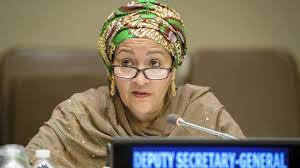United Nations Deputy Secretary-General, Amina Mohammed, has lamented that there seemed to be no easy road ahead to the recovery from COVID-19 pandemic.
Speaking yesterday at the 2021 Humanitarian Action Conference in Abuja, Mohammed said, “After an extremely difficult year, we are now working towards a recovery from the pandemic to put countries back on the path towards the Sustainable Development Goals. But we do not have an easy road ahead.”
Mohammed, whose speech was read by the Country Director Nigeria, Chemonics International, Dr. Mike Egboh, said: “Many parts of the world where we work are still dealing with the impact of the pandemic.
“This year has brought its own challenges, with deepening crises in Afghanistan and Ethiopia, and famine looming in many parts of the world.”
She lamented that in times of such crises, marginalised women and girls bore the consequences the most, noting that: “Women and girls with disabilities, older women, widows and single-headed households, indigenous women and girls, and adolescent girls are further marginalised.”
That, she said, brought to the fore, extreme suffering, such as hunger, existing gender inequality increases, and risks of gender-based violence are heightened.
“For example, during the pandemic, Somalia experienced a resurgence of female genital mutilation. In the Sahel, the pandemic, coupled with conflict, drought and severe climate events, caused spikes in early marriage, intimate partner violence and sexual violence.
“The pandemic also laid bare the profound inequities that plague indigenous people, especially, women and girls in Latin America and the Caribbean,” Mohammed said.
She noted that the pandemic had taught the world important lessons, better social protection, universal health care, vaccine equity, effective governance and strong institutions would have saved lives.
She, however, said this called for six important actions.
“First, we must ensure women’s experiences and priorities remain central to humanitarian action. We must listen to and be guided by affected communities, especially, by marginalised women and girls.
“Second, we must ensure women are engaged in humanitarian decision-making. We must bring women’s organisations and leaders to the table.
“Third, we must fund women’s and local organisations so they can truly empower and support communities in crisis. In many countries, women’s groups are actively engaged in implementing the humanitarian, development and peace nexus, making these efforts more sustainable and equitable in the long term.
“So, the fourth action is to better connect development and humanitarian work towards achieving the ambition of the SDGs. We are already doing that within the UN.
“Many countries, such as in the Sahel and the Horn of Africa, are strengthening collaboration by working towards collective outcomes that are specific to the context. The UN Joint Steering Committee is actively supporting this work.
“For example, in Burkina Faso, the collective outcomes of the United Nations Sustainable Development Cooperation Framework, or the UNSDCF, cover access to basic social services, food and nutrition, protection and security. Other countries, such as the Democratic Republic of the Congo, have included a specific collective outcome on gender-based violence.
“As you might know, the framework reflects each country’s priorities and plans in pursuing the SDGs.
“The fifth action is for countries dealing with increasing numbers of crises and a climate emergency to take ownership of the pathways to the SDGs.
“For example, Niger has developed its own concept. Its tripartite Technical Committee on the NEXUS Emergency Development has significantly improved coordination capacities at the decentralized level and the promotion of flexible and multi-year funding mechanisms, and strengthened the coordination of emergency development funding.
“The programmes for collective outcomes cover multi-year time frames that require extensive funding commitments from donors. Niger’s plans have been affected by insufficient funding, which has led to a persistent lack of social services.
“So, the sixth call for action is to work with Governments to mobilize and align a wide range of financing sources — public and private, domestic and international – to help those Governments build back better.”









